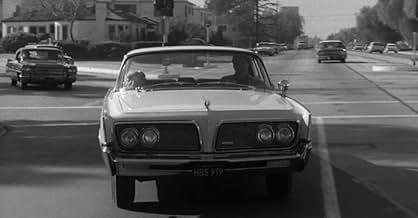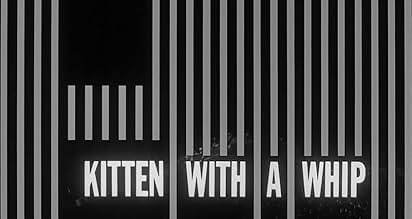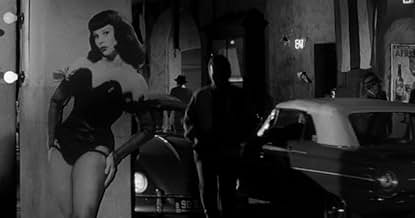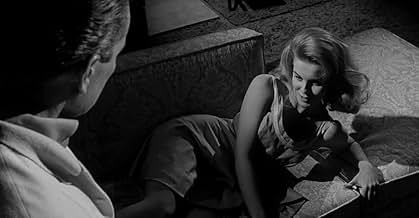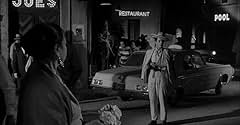AVALIAÇÃO DA IMDb
5,2/10
1,6 mil
SUA AVALIAÇÃO
Um político em ascensão enfrenta escândalo e chantagem quando a jovem que ele tenta ajudar acaba se tornando uma delinquente juvenil.Um político em ascensão enfrenta escândalo e chantagem quando a jovem que ele tenta ajudar acaba se tornando uma delinquente juvenil.Um político em ascensão enfrenta escândalo e chantagem quando a jovem que ele tenta ajudar acaba se tornando uma delinquente juvenil.
- Direção
- Roteiristas
- Artistas
- Direção
- Roteiristas
- Elenco e equipe completos
- Produção, bilheteria e muito mais no IMDbPro
Avaliações em destaque
The title says it all! A whip is not always a lash... the whip in the title of this cult movie favorite refers to the many ways and means sociopathic sex kitten Jody (Ann-Margaret) dominates and lashes out at everyone in her path. At one point she yanks and tugs the phone cord while the candidate for Senator (John Forsythe) is on the horn to his wife trying to act like nothing's the matter! Cmon, that length of wire is definitely a whip -in Jody's hands! Then later Jody flings a cocktail into the scratchmarks she's inflicted on Forsythe. She's whipping him back and forth, he just wants her to leave without any guilt or scandal- and she uses this over him at any given moment, not sparing herself, as her own guilt and confusion whips her from self-loathing to frenzied party animal in stacatto snaps - I find this movie full of innuendo, black humor, Hitchcockian situations, it's a guilty pleasure! The music is often reminiscent of Pete Rugolo's THRILLER TV soundtrack, and indeed, the director Douglas Heyes directed many of THRILLER's best episodes, including "The Cheaters" I give this two twisted thumbs up. Don't miss it!
Most juvenile delinquency films of the 1950s and early 60s were about the damage kids could inflict on themselves or their classmates. By 1964 America was perhaps subconsciously anticipating the fallout from being involved in Vietnam, and started to exhibit concern about youth's impact on the older generation. Kitten With A Whip may or not not have been Universal's answer to Paramount's Lady In A Cage, but both films convey the same message: the inmates are capable of taking over the asylum. By the end of the decade films like Wild In the Streets and Gas-s-s-s-s-s were taking this theme to its logical extreme.
Kitten With A Whip takes us on a surprisingly seedy tour of the youth underworld, and even though it's another conservative morality play with a happy ending, it serves as a valuable reminder of the social changes underway in the mid 60s. It's also incredibly entertaining.
Kitten With A Whip takes us on a surprisingly seedy tour of the youth underworld, and even though it's another conservative morality play with a happy ending, it serves as a valuable reminder of the social changes underway in the mid 60s. It's also incredibly entertaining.
Director Douglas Heyes oversaw 9 of the better Twilight Zone episodes, including the classic Eye of the Beholder, and one of the 2 or 3 best Boris Karloff Presents Thriller episodes (The Purple Room). Bringing this context to Kitten With A Whip, you realize you are in the hands of a master storyteller, and also, exactly what you are in for: a not-quite-fantasy but nonetheless feverishly nightmarish Twilight Zone episode.
As with the best TZ episodes, you are asked what you would do if something on the scale between patently impossible to utterly insane happened to you. The setup is simple. A mentally unbalanced teenager sneaks into your house while you are away, threatens you with accusations of rape and the destruction of your political ambition (which appear about to reach fruition) to gain control once you return home, and effectively takes over your life. It is like a typical TZ scenario, a Twilight Zone-style turning a character's 'normal' life on its head, and letting the angst and desperate quest for an out flow from there.
I see no big theme here, other than the noir theme of crazy fate putting its finger on you. That seems to be the entire point here. Separated from Serling's big theme plots that showed man against himself in the form of prejudice and fear, Heyes may seem a bit lost. But his directorial hand is sure as ever, and the story is as engrossingly told as that of any TZ episode. I suspect Heyes enjoyed taking TV's Bachelor Father and subverting the precepts of his bourgeois existence in the rudest, most thoroughly shaming way possible. Maybe, after all is said and done, it is through subversion that Heyes gets his chance to challenge the bourgeois status quo, as he did routinely while working with Serling. For many- and yes, possibly even the director- Kitten works as a jet black comedy.
This film doesn't have a great reputation, though among its undeniable assets it boasts a fine performance from a man often unfairly given the Bob Cummings light comic actor brush-off by Hollywood. John Forsythe would appear In Cold Blood a couple of years later, another film light years away from the scrubbed sitcom milieu.
8 stars. Give it a spin.
As with the best TZ episodes, you are asked what you would do if something on the scale between patently impossible to utterly insane happened to you. The setup is simple. A mentally unbalanced teenager sneaks into your house while you are away, threatens you with accusations of rape and the destruction of your political ambition (which appear about to reach fruition) to gain control once you return home, and effectively takes over your life. It is like a typical TZ scenario, a Twilight Zone-style turning a character's 'normal' life on its head, and letting the angst and desperate quest for an out flow from there.
I see no big theme here, other than the noir theme of crazy fate putting its finger on you. That seems to be the entire point here. Separated from Serling's big theme plots that showed man against himself in the form of prejudice and fear, Heyes may seem a bit lost. But his directorial hand is sure as ever, and the story is as engrossingly told as that of any TZ episode. I suspect Heyes enjoyed taking TV's Bachelor Father and subverting the precepts of his bourgeois existence in the rudest, most thoroughly shaming way possible. Maybe, after all is said and done, it is through subversion that Heyes gets his chance to challenge the bourgeois status quo, as he did routinely while working with Serling. For many- and yes, possibly even the director- Kitten works as a jet black comedy.
This film doesn't have a great reputation, though among its undeniable assets it boasts a fine performance from a man often unfairly given the Bob Cummings light comic actor brush-off by Hollywood. John Forsythe would appear In Cold Blood a couple of years later, another film light years away from the scrubbed sitcom milieu.
8 stars. Give it a spin.
Having just seen this film for the second time in some years I felt I needed to come to its defense in view of the poor ratings it has received on IMDb. Moreover I can't help but compare it to "Rebel Without a Cause" which I also recently saw again. Released nine years apart they both deal with the same subject, disaffected youth. They also both reflect their times. Whereas "Rebel" dances around young angst, "Kitten" is more honest about it, although nowhere near as raw as it would have been done today. In "Rebel" the kids are troubled but still seek comfort from their parents, in "Kitten" they're nihilistic, rebellious, disdainful of their parents' values. "Kitten" is edgy, mean, gritty. Its poverty-row production probably helped in that respect. The limited sets added to the sense of claustrophobia, the fear of exposing a dangerous secret in the open. And the references to the finality of the atom bomb add to the general sense of despair.
I found the acting competent if not outstanding. All protagonists had their highs and lows and overall they acquitted themselves rather well, even John Forsythe who does tend to be one-dimensional. I even think that may have worked in his favor playing a conflicted middle-aged man whose estranged wife is away, suddenly being confronted with a sexually charged dynamo. It seems such a man would be on the introverted side. And his suspicious attitude hinted at something sinister. After all, if he had nothing to hide, wouldn't he have reached out for help? He had plenty of opportunities but wasted them all, to the very end, when Ann-Margret walks back to the car and takes away his car keys.
One final note: Audrey Dalton had the most thankless part. She had not even one single line, no screen time at all. We only get to see her in a photo soon to be vandalized. And when Forsythe goes to buy size seven clothes for Ann-Margret we are told that Dalton's character would never fit in them. That's rather unkind because I think she's actually smaller than Ann-Margret. So to top it all off she has to suffer the indignity of being called fat, or at least big, and she doesn't get the chance to show us otherwise. Then again maybe that's just it, she doesn't have any screen time because the whole clothes scene wouldn't fit in.
I found the acting competent if not outstanding. All protagonists had their highs and lows and overall they acquitted themselves rather well, even John Forsythe who does tend to be one-dimensional. I even think that may have worked in his favor playing a conflicted middle-aged man whose estranged wife is away, suddenly being confronted with a sexually charged dynamo. It seems such a man would be on the introverted side. And his suspicious attitude hinted at something sinister. After all, if he had nothing to hide, wouldn't he have reached out for help? He had plenty of opportunities but wasted them all, to the very end, when Ann-Margret walks back to the car and takes away his car keys.
One final note: Audrey Dalton had the most thankless part. She had not even one single line, no screen time at all. We only get to see her in a photo soon to be vandalized. And when Forsythe goes to buy size seven clothes for Ann-Margret we are told that Dalton's character would never fit in them. That's rather unkind because I think she's actually smaller than Ann-Margret. So to top it all off she has to suffer the indignity of being called fat, or at least big, and she doesn't get the chance to show us otherwise. Then again maybe that's just it, she doesn't have any screen time because the whole clothes scene wouldn't fit in.
Ann-Margret gets her first dramatic role, that of a delinquent sociopath named Jody who's all out for KICKS! The part stuck her with a 'bad girl' rep for a number of years, but the good news is A-M seems to relish this change of pace and gives an exceptionally strong performance. Unfortunately, the general handling of "Kitten With a Whip" is far too broad and quasi-colorful, and the film fails as a message picture, though its stale J-D clichés and overwrought dialogue ("You're so nothing painted blue!", "Where the hell is T-town?!") turns it into a dizzying dark comedy. John Forsythe plays a weakling politician who gets mixed up with the girl and her creepy post-teenage buddies, and the plot-developments become increasingly far-fetched. Still, the black-and-white cinematography is excellent, Ann-Margret is electric, and the pacing seldom flags. *** from ****
Você sabia?
- CuriosidadesRecycles portions of Henry Mancini's music from A Marca da Maldade (1958).
- Erros de gravaçãoBetween shots, as Jody stands at the stairs telling David her story, her hair changes position.
- ConexõesFeatured in Mystery Science Theater 3000: Kitten with a Whip (1994)
Principais escolhas
Faça login para avaliar e ver a lista de recomendações personalizadas
- How long is Kitten with a Whip?Fornecido pela Alexa
Detalhes
- Tempo de duração
- 1 h 23 min(83 min)
- Cor
- Proporção
- 2.00 : 1
Contribua para esta página
Sugerir uma alteração ou adicionar conteúdo ausente

